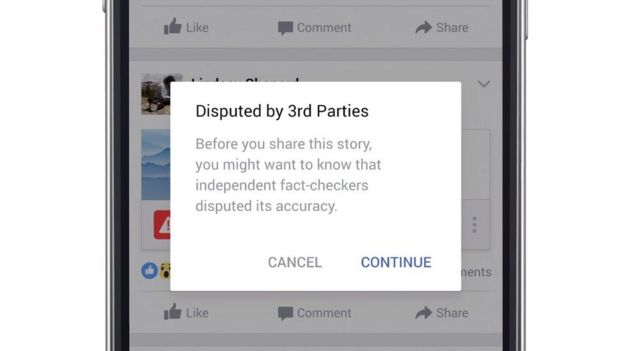Most people seem to agree that "fake
news" is a big problem online, but what's the best way to deal with it?
Is technology too blunt an instrument to discern truth from lies,
satire from propaganda? Are human beings better at flagging up false
stories?
During the run-up to the 2016 US presidential election,
we were treated to headlines such as "Hillary Clinton sold weapons to
Isis" and "Pope Francis endorsed Donald Trump for President".Both completely untrue.
But they were just two examples of a tsunami of attention-grabbing, false stories that flooded social media and the internet. We were awash with so-called "fake news".
Many such headlines were simply trying to drive traffic to websites for the purpose of earning advertising dollars. Others though, seemed part of a concerted attempt to sway public opinion in favour of one presidential candidate or the other.
Commentators heaped opprobrium on Facebook founder Mark Zuckerberg for not doing more to block such content on his influential social media platform, which now has more than two billion users worldwide.
"Of all the content on Facebook, more than 99% of what people see is authentic," he wrote in defence last November. "Only a very small amount is fake news and hoaxes."
But a study conducted by news website BuzzFeed revealed that fake news travelled faster and further during the US election campaign.
The 20 top-performing false election stories generated 8,711,000 shares, reactions, and comments on Facebook, whereas the 20 best-performing election stories from 19 reputable news websites generated 7,367,000 shares, reactions and comments.
"Due to our tendency as humans to believe in things that already support our opinions, it finds readers who then spread it to like-minded individuals using social media," says Magnus Revang, research director at Gartner.

It is also working with independent fact-checking organisations, such as Snopes, to help police its pages.
"If the fact-checking organisations identify a story as false, it will get flagged as disputed and there will be a link to a corresponding article explaining why," explained Facebook's Adam Mosseri in April.
Snopes managing editor Brooke Binkowski tells the BBC: "We don't really take directives from Facebook, we have a partnership, which means that if we have already debunked a story we mark it as debunked if it appears in a list of disputed news stories that is provided to us."
Snopes uses a small editorial team to debunk, myths, urban legends and fake news, but a team of international students thinks an algorithm can do the job.
"Many social media giants had rejected the idea that an algorithm could detect fake news," says Anant Goel, FiB's 18-year-old co-founder.
"We check the authenticity of the link itself for things such as malware, inappropriate content or how often fake news comes from that particular news site," explains Mr Goel, originally from Mumbai, India, now studying computer science at Purdue University in the US.
"We also cross-check the content of each article across multiple databases to ensure the same thing is mentioned on other sources as well.
"Depending on both of these factors, we generate an aggregated score. Anything that gets a rating below 70% gets marked as incorrect," he says.
Other Chrome extensions, such as B.S. Detector and Fake News Alert, aim to do similar things.
But is this labelling-by-algorithm approach the right one? Gartner's Mr Revang has his doubts.
"The challenge is that we would then be more inclined to believe stories that didn't have the label," he says.
And this assumption would be "a real danger", he believes. "You would have plenty of stories it didn't detect, and some stories it would falsely detect.
"The real danger, however, would be that adopting AI [artificial intelligence] to label fake news would most likely trigger fake news producers to increase their sophistication in order to fool the algorithms."
0 comments: